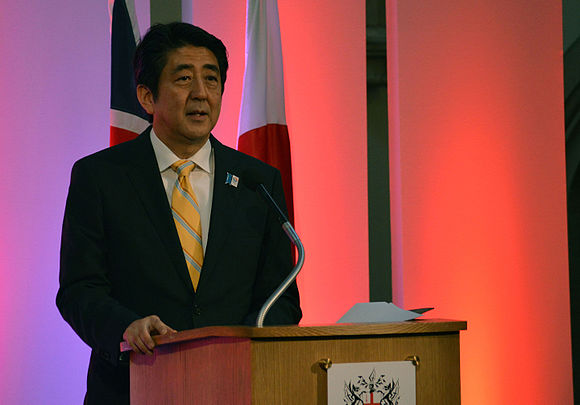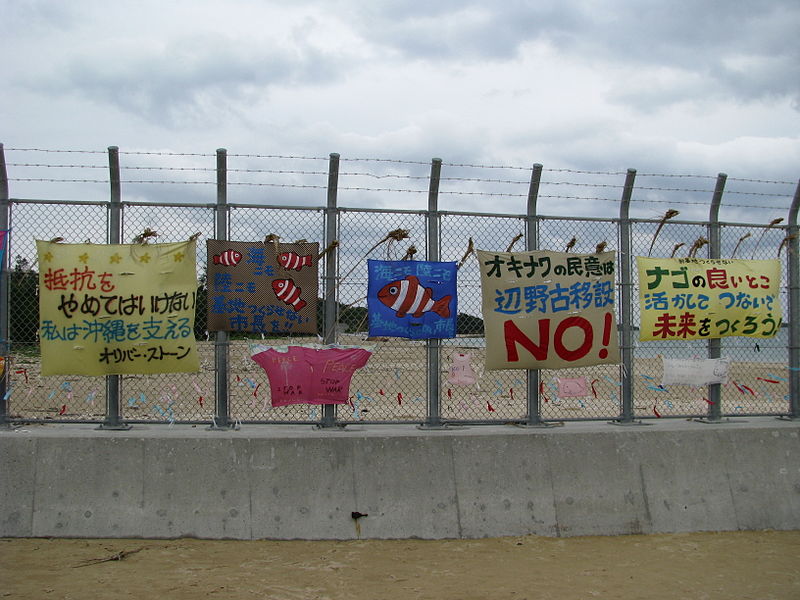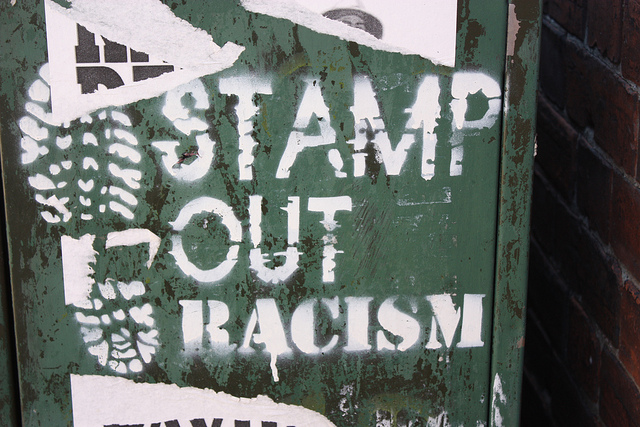In the recent in-party election held on September 20th, Prime Minister Shinzo Abe secured a historic third term as the Prime Minister of Japan, defeating former Defense Minister Shigeru Ishiba by an overwhelming margin.[1] Guaranteed executive control of the central government for the next three years, Abe has begun to set his political agenda for this term. Perhaps most noteworthy has been his reaffirmed desire to revise Article 9 of Japan’s Constitution, a task much easier said than done. In the press conference immediately following the in-party election, the Prime Minister suggested it was the “right time to reform the Constitution, and move the country into its future.”[2]
Encouraged by American General Douglas MacArthur after World War II, Article 9 was incorporated in the Constitution to prevent Japan from ever again posing a military threat: “the Japanese people forever renounce war as a sovereign right of the nation and the threat or use of force as means of settling international disputes.”[3][4] In accordance with these principles, the Constitution further vows that “land, sea, and air forces, as well as other war potential, will never be maintained. The right of belligerency of the state will not be recognized.”[5] With this second provision, Japan essentially relinquished its potential to declare or go to war in perpetuity—or at least until a Prime Minister who was willing to revisit the provision entered office.
Prime Minister Abe and the Cabinet of Japan seem confident in their ability to amend Article 9. Recently, a top official claimed that the amendment would pass within one year, and political analysts close to the cabinet claim that even some opposing parties would be willing to vote for the amendment.[6][7] However, Abe still faces a number of significant obstacles. The largest challenge for the executive government will likely originate from the widespread lack of public understanding. Quite simply, the Japanese people don’t seem to have a good understanding of what a revision to Article 9 would entail.[8] Pushing such a monumental amendment through the legislature without an identifiable and reasonable purpose will not be enough. In the name of democracy and popular sovereignty, Japanese citizens are entitled to an explanation, and deserve one before any major constitutional action is undertaken.
The logistics and language of a constitutional amendment to Article 9 are not nearly as well-defined as Prime Minister Abe’s commitment to a revision. Several proposals for revising the Article are currently being contemplated by the ruling Liberal Democratic Party (LDP). One proposal includes codifying the existence of Japan’s Self Defense Force (SDF) into the Constitution, while leaving the bulk of the Article untouched.[9] The Japanese SDF was originally established as the National Police Reserve after World War II, and has never been used outside of Japan or its surrounding waters (aside from its controversial support of several UN peacekeeping missions).[10] Another more confrontational proposal suggests removing the second provision entirely, and replacing it with a clause that explicitly grants the SDF war-waging powers.[11]
As with any complex political issue, each proposed solution has its own unique set of problems. Japan’s SDF has long been considered an organization that has the “minimum necessary level” of military strength for self-defense and, as such, has never been considered unconstitutional.[12] The chief concern with writing the SDF (under its current definition) into the Constitution is whether this “minimum necessary level” would include a right to protect Japan’s allies in the case of international conflict.[13] Merely adding “organization with force” into the definition of the SDF would not conclusively define the parameters of “self-defense.”[14] Still, other proposals suggest dropping the second provision entirely, explicitly establishing the SDF as an army.[15] This would completely violate the current provisions of the Article, effectively rendering Article 9 null and void. Though this may seem like a drastic measure, the irony of the SDF is that despite what its name may suggest, it has the capacity to stand toe-to-toe with most full-fledged militaries around the world.[16] Realistically, the sole difference between the SDF and other countries’ militaries lies in its inability to call itself an army and proactively intervene in armed conflicts.
Though Abe and his cabinet have consistently declared that the revision is intended only to clarify the legal status of the SDF, opposition parties are doubtful. Opposition parties have suggested that the rewriting of Article 9 is primarily a move by Prime Minister Abe to secure his own personal legacy. The Prime Minister had suggested at one point that he wished to revise the Constitution before the 2020 Tokyo Olympics, but quickly backpedaled once this was deemed impossible.[17] As there is speculation that this will be Abe’s last term as prime minister, it seems as though he is growing increasingly desperate to pass an amendment.[18] Opposition parties argue that the amendment is the administration’s attempt to draw attention away from the many scandals and economic stagnancy that have plagued Abe’s tenure—a golden opportunity to end his political career with a toutable achievement. Regardless of his true intentions, it is unconscionable that the Prime Minister put his personal desires above those of the Japanese public, abusing his party’s majority by passing a monumental amendment about which almost 40% of voters are undecided.[19]
In order to ratify a revision to the Constitution, the amendment must pass with a super-majority through both Houses and then with a majority in a national referendum.[20] As is the case in American politics, a super-majority in both Houses can be quite a difficult consensus to secure. However, one huge difference exists between the American and Japanese systems: compulsory adherence to the party’s decisions. If the party decides to vote one way, all the politicians must toe the party line. This is something that probably comes as a surprise to Americans accustomed to Democrats or Republicans occasionally voting against legislation introduced by fellow party members. In Japan, voting against the party would result in dismissal, secession, or verbal reprimand.[21] Considering that the ruling LDP-Komeito Party coalition currently holds a majority in both Houses—312 out of 465 seats in the House of Representatives and 150 out of 242 seats in the House of Councillors—the ruling party is practically free to pass any legislation it wishes.[22][23] It is from this immense power that the administration’s confidence presumably stems. Should Abe draft an amendment and successfully pass it through both Houses, the fate of Article 9 would rest squarely with the Japanese people, and, in that case, data suggests that its fate would be far from certain.
Opinion polling of Japanese citizens has brought to light the glaring lack of public understanding surrounding the issue of Article 9 and its implications for Japanese politics. A recent poll conducted by NHK (Japan Broadcasting Corporation) suggested that 29% of Japanese citizens support revision of the Article, while 27% are opposed.[24] What is striking from these results is not necessarily the division within the population, but that close to 40% of people don’t even know whether they support or oppose the revision.[25] The first logical step would then be to educate the citizens on the economic, social, and political ramifications of revising Article 9. Some citizens are under the impression that the revision would foster more violence in Asia and that the relative regional peace that has existed for decades would inevitably cease.[26] However, the reality is that a revision would almost certainly not be intended to militarize Japan in the same way it was militarized in the 1940s. The Prime Minister’s main goal seems to be enabling the SDF to settle existing international conflicts rather than start new ones, but it is clear that people need this reassurance from the government before any actual revision can occur.
The worst case scenario would be for the amendment to be passed in the current environment of public ignorance. Even if the Japanese people did approve the amendment in a national referendum, can democracy truly prevail in an environment where approximately 40% of the citizens are undecided on the issue? Some solace can be found in the fact that politicians are unlikely to risk their seat by supporting the amendment amidst vocal public opposition. With the 2019 House of Councillors election around the corner, politicians are unlikely to vote against the preferences of their constituents, which gives citizens a great opportunity to have their voices heard. At the moment, however, there’s not enough incentive for politicians to ignore the party agenda and postpone a decision should the administration propose an amendment. For the sake of democracy, Japanese citizens on both sides of this issue must come together to demand a more comprehensive plan and explanation before any serious decisions are made.
The citizens of Japan have the right to hold their government accountable for any legislation it attempts to pass. In a country with no strong partisan affiliations, people either need to mobilize more effectively, or politicians need to engage more closely with their constituents. An amendment of Article 9 is sure to eventually pass both Houses and come down to a national referendum. Before they are forced unwillingly into this situation, Japanese citizens regardless of political ideology must be proactive and demand that their representatives explain the motivations and consequences of this constitutional revision. Without this explanation, there is a great risk that people will vote without a sound understanding of the issue or, perhaps even worse, decide not to vote at all. The results of this referendum should turn on the sentiments of all Japanese citizens, not only the 60-70% who have made up their minds. The tyranny of the majority cannot prevail in a moment of such tremendous and lasting importance for the nation’s future.
SOURCES:
[1] Osaki, Tomohiro. “Abe Tops Ishiba in Liberal Democratic Party Election and Secures Historic Third Term.” The Japan Times. September 20, 2018. https://www.japantimes.co.jp/news/2018/09/20/national/politics-diplomacy/abe-tops-ishiba-liberal-democratic-party-election-secures-historic-third-term-power/#.W8O4xhNKh0s.
[2] “Prime Minister “Challenging the Revision of Article 9″ 3rd Term as Head of LDP, 3 Year-Tenure.” Nikkei Newspaper. September 20, 2018. https://www.nikkei.com/article/DGXMZO35578300Q8A920C1MM8000/.
[3] Sasaki, Tomoyuki. “An Army for the People : The Self- Defense Forces and Society in Postwar Japan.” EScholarship University of California. April 12, 2013. https://escholarship.org/uc/item/58n4d7wb.
[4] “The Constitution of Japan.” THE CONSTITUTION OF JAPAN. Accessed September 6, 2018. https://japan.kantei.go.jp/constitution_and_government_of_japan/constitution_e.html
[5] “The Constitution of Japan.”
[6] “LDP Secretary General Nikai, ‘Amendment Will Be Passed Within 1 Year.’” Nikkei Newspaper. January 12, 2018. https://www.nikkei.com/article/DGXMZO25650410S8A110C1EA3000/.
[7] Miyazaki, Ami. “LDP-Komeito Coalition Win Election – Article 9 Amendment to Move Forward.” Reuters. October 22, 2017. https://jp.reuters.com/article/japan-election-analysis-idJPKBN1CR0NI?rpc=122.
[8] Japan Broadcast Corporation. “Public Opinion Poll Regarding the Constitution 2018.” NHK World. https://www3.nhk.or.jp/news/special/kenpou70/yoron2018.html
[9] “Editorial: LDP’s Proposed Revision to Article 9 Fraught with Problems.” The Mainichi. March 01, 2018. https://mainichi.jp/english/articles/20180301/p2a/00m/0na/019000c.
[10] Britannica, The Editors of Encyclopaedia. “Self-Defense Force.” Encyclopædia Britannica. April 21, 2011. https://www.britannica.com/topic/Self-Defense-Force.
[11] “Editorial: LDP’s Proposed Revision to Article 9 Fraught with Problems.”
[12] Ibid.
[13] Ibid.
[14] Ibid.
[15] Ibid.
[16] Lendon, Brad. “Resurgent Japan Military ‘can stand toe to toe with anybody.'” CNN. December 07, 2016. https://www.cnn.com/2016/12/06/asia/japan-military-pearl-harbor-anniversary/index.html.
[17] Reynolds, Isabel, and Emi Nobuhiro. “Abe Eroding Japan Pacifism for Own Legacy, Opposition Chief Says.” Bloomberg. December 25, 2017. https://www.bloomberg.com/news/articles/2017-12-26/abe-eroding-japan-pacifism-for-own-legacy-opposition-chief-says.
[18] Rich, Motoko. “Shinzo Abe Gets One Step Closer to Becoming Japan’s Longest-Serving Premier.” The New York Times. September 20, 2018. https://www.nytimes.com/2018/09/20/world/asia/japan-shinzo-abe-election.html.
[19] Japan Broadcast Corporation. “Public Opinion Poll Regarding the Constitution 2018.”
[20] Umeda, Sayuri. “Japan: Interpretations of Article 9 of the Constitution.” Planning D-Day (April 2003) – Library of Congress Information Bulletin. September 01, 2015. https://www.loc.gov/law/help/japan-constitution/interpretations-article9.php.
[21] “What Is Party Restraint?” 辞典・百科事典の検索サービス – Weblio辞書. Accessed October 15, 2018. https://www.weblio.jp/content/党議拘束.
[22] “Number of Members of Parliament by Faction.” The House of Representatives, Japan. October 10, 2018. http://www.shugiin.go.jp/internet/itdb_annai.nsf/html/statics/shiryo/kaiha_m.htm.
[23] “Strength of the Political Groups in the House of Councillors.” House of Councillors, The National Diet of Japan. October 15, 2018. http://www.sangiin.go.jp/japanese/joho1/kousei/giin/193/giinsu.htm.
[24] Japan Broadcast Corporation. “Public Opinion Poll Regarding the Constitution 2018.”
[25] Ibid.
[26] Gover, Ted. “Abe’s Right – It’s Time to Codify the SDF.” The Japan Times. March 27, 2018. https://www.japantimes.co.jp/opinion/2018/03/27/commentary/japan-commentary/abes-right-time-codify-sdf/#.W8_WkBNKh0s.



